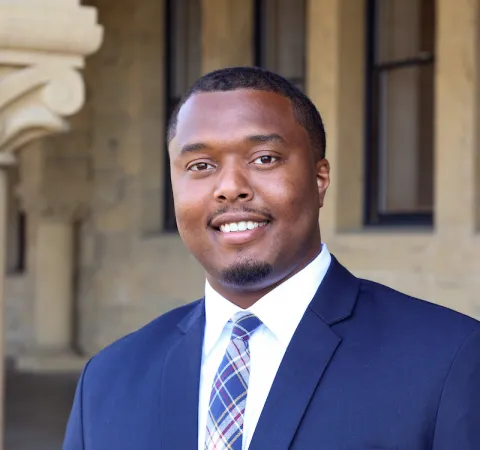
Darion Aaron Wallace

As I was explaining the graduate programs that I had been accepted to during a university’s MA admit day, an undergraduate student asked me “what is your philosophy of education?”. After giving an answer that I was not completely satisfied with this question illusively sat with me as I entered Stanford. Upon initial introspection, I was drawn to the memory of my mother telling me that education was the key to a better quality of life. I didn’t think much of it then, but after going to college I understood better that she meant that education was an opportunity to enhance social mobility, develop untapped potential, and dismantle interlocking system of power and privilege. For me education has been a core vehicle to hold doors open for the next generation that will come after me as generations before have done for me.
Even in unexpected work settings education has undergirded many of my experiences. As the son of two union workers I afforded some aspects of my upbringing to the benefits that unionism secured for my parents, such as a living wage, employer paid healthcare, and retirement benefits. As a union organizer with the Service Employees International Union – United Healthcare Workers West I had the opportunity to extend those benefits to other families, which was the driving source of motivation to do this work.
However, education surfaced an additional motivating factor when I started working on the Education Fund project to enroll union workers into certificate, licensure, or degree granting programs. I got to listen to the stories of the educational journey of so many working class people, particularly workers of color. I heard about the many missed opportunities regarding under-resourced schools, hegemonic curriculums, and various other areas of growth for our education system. These stories encouraged me to apply to Stanford to learn about how to create equitable, accessible and effective learning techniques for all students.
Stanford offered me a litany of resources that sharpened my research capacities, expanded my understanding of canonical education theory, and exposed me to a network of ingenious scholars across the ranks of students, faculty, and alumni. Upon arriving to campus, the GSE paired me with a graduate mentor who was instrumental in mapping out the landscape of the GSE and larger university. The small cohort size allowed for me and my fellow classmates to create a strong professional network rooted in collegiality and friendship. I had the opportunity engage in cross-disciplinary coursework through taking classes at the law school, which enriched the policy component of the IEPA program. The most distinctive difference about Stanford’s MA program is writing the thesis of publishable quality that trains students to generatively contribute to the field of education with research driven solutions.
I am grateful for my experience at the Stanford GSE for exposing me to various philosophies of education that have helped to better define my own. As my tenure at Stanford has come to a close, I know that my educational journey has not. Motivated by the words of Assata Shakur: “it is our duty to fight for our freedom, it our duty to win”, I have decided to pursue doctoral studies in search of reimagining and recreating an educational system that allows for every student to reach their fullest and highest potential. As I move into this next chapter of life I enter it thankful for the personally, professionally, and intellectually growth that Stanford has provided me.
